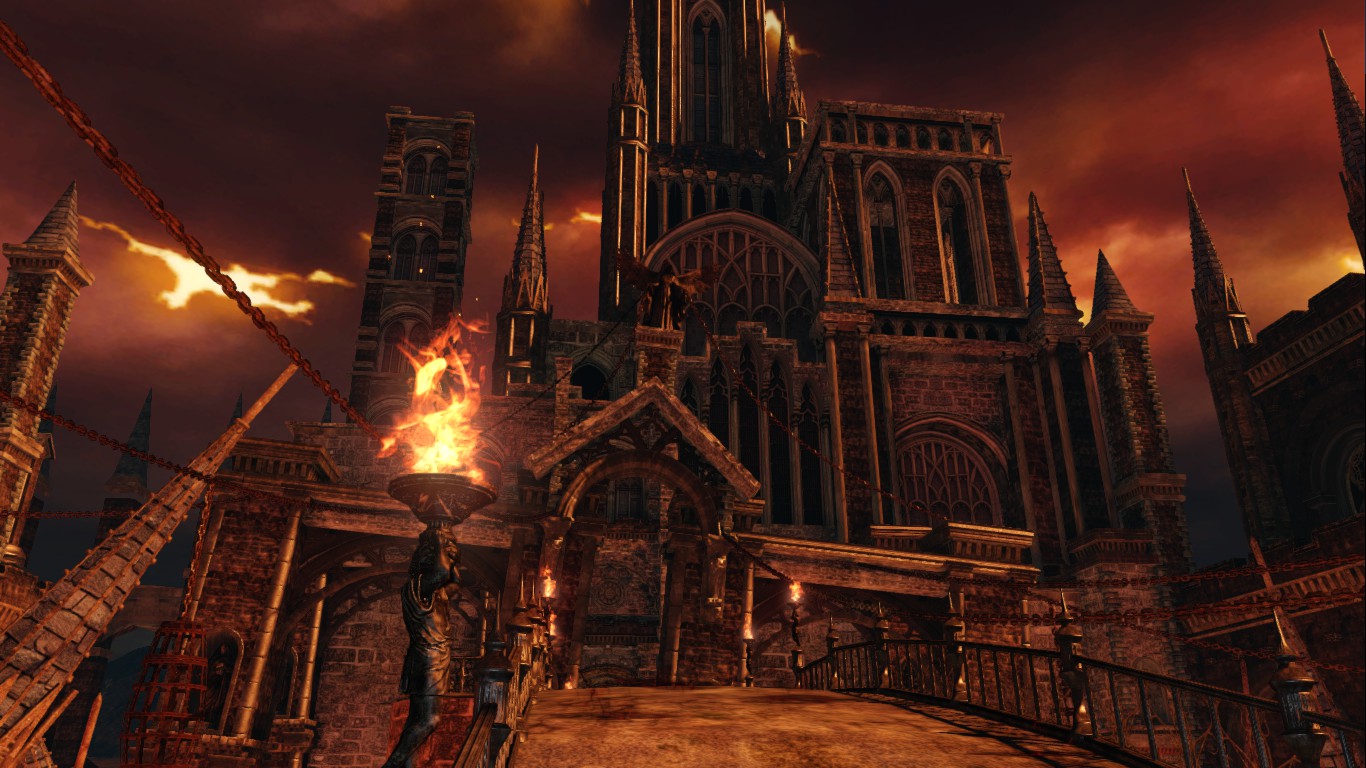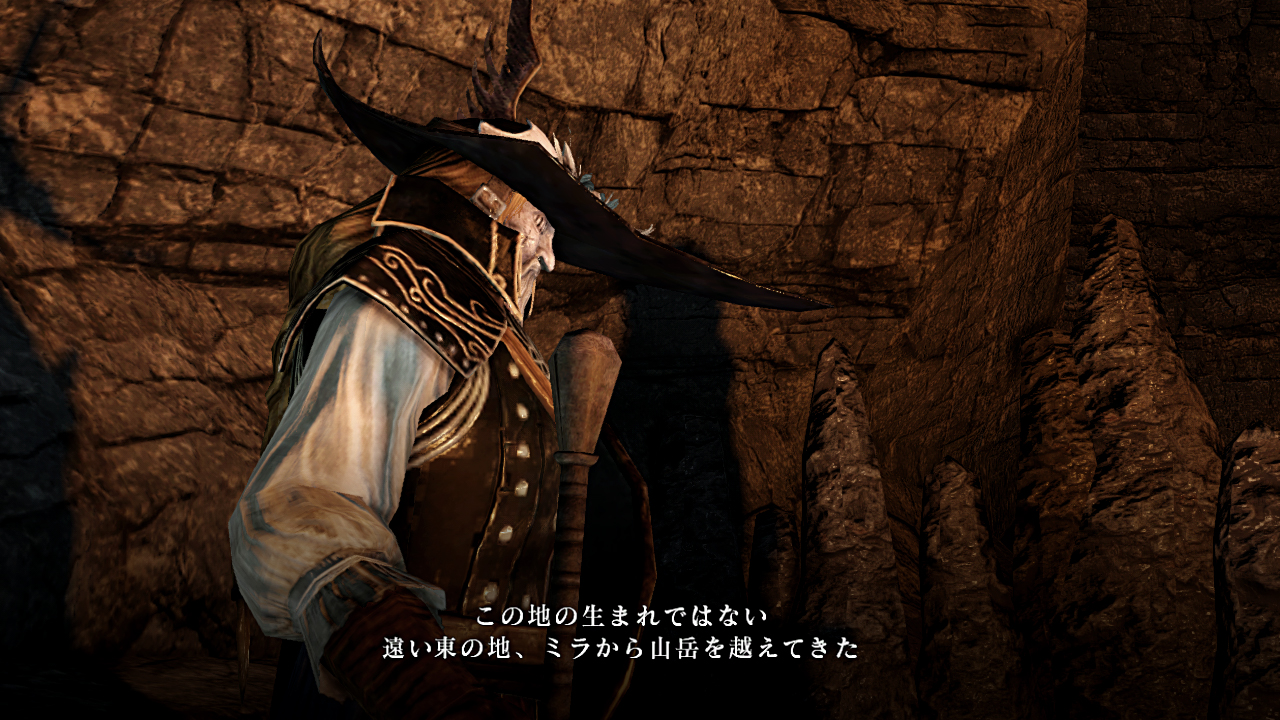It took me damn near a month to complete the game… then I
delayed posting this review a week because my schedule was entirely too full.
But I’d rather have a full schedule than delay everything constantly. So here’s
the review some of you have been waiting for… Dark Souls 2.
A little bit of perspective. I’ve never played the first Dark Souls game. I played this one first
because I’ve heard from others that it is not only somewhat easier (or at least
more approachable) than the first game. But it’s also supposedly not as good as
the first game. So I figured, what the hell, let’s play the second game first
so I can be one of the few reviews that examines Dark Souls 2 on its own merits. Plus I want to learn how to play
before diving into the harder games of Dark
Souls or even Demons Souls. I may
very well review the earlier games in this “franchise” at some point, but I
promise no guarantees.

You are an undead, a bearer of some strange curse. You meet
a woman who is called the Emerald Herald and she tells you that the land is
slowly dying and that you must venture forth to collect the four great souls
that can gain you access to Drangelaic Castle. Once there, you can find out
where King Vendrick is and what he did to cause all of these problems. But once
there, you find out there’s more sinister happenings on when you meet King
Vendrick, Queen Nashandra, and explore Aldia’s Keep which reveals some of the
darker secrets of both the King and Queen.
 But the story isn’t the main crux of the game. I mean, yes,
it’s interesting and worth looking into if you have the spare time to do so.
But you don’t play a Dark Souls game
to get engrossed in an epic story. You play because you want to experience the
challenging gameplay and overcome seemingly insurmountable obstacles to
accomplish whatever mission you were sent out to do. Challenge is the main crux
of the game and while fans of the series will argue it isn’t there, I’d still
say it is. And the ability for this game to be more approachable is easily the
best part about it.
But the story isn’t the main crux of the game. I mean, yes,
it’s interesting and worth looking into if you have the spare time to do so.
But you don’t play a Dark Souls game
to get engrossed in an epic story. You play because you want to experience the
challenging gameplay and overcome seemingly insurmountable obstacles to
accomplish whatever mission you were sent out to do. Challenge is the main crux
of the game and while fans of the series will argue it isn’t there, I’d still
say it is. And the ability for this game to be more approachable is easily the
best part about it. 
It’s an idea that allows non-fans of the series to dip their
toes into the world without feeling beaten down and completely alienated by
this game’s offerings. And the game still isn’t a cake walk. On route to the
first boss encounter (which I took the harder route like an idiot) I died so
many times I unintentionally depopulated an idea, forcing the monsters I fought
to slowly disappear after so many tries of just getting to the boss. It’s
discouraging to lose so many souls, die so many times, and basically be an
undead for so long.
 But in defeat I learned from my mistakes. I eventually got
better at dodging. I improved my damage output from my reliable, but weak
little mace to my 1000-point-hit Ultra Great Sword, which allowed me to take
down foes in one to three hits instead of needing five or six. I also became
better at reading attacks and eventually started adding spells and magic to my
repertoire to help give me more options for enemies I had trouble dealing with
at close range. I forced myself in the early game to learn close-range combat
because I wanted to know I could reliably fight at close range so if I ever ran
out of spells I could still fight. Trust me, it’s tough, but it’s worth it.
But in defeat I learned from my mistakes. I eventually got
better at dodging. I improved my damage output from my reliable, but weak
little mace to my 1000-point-hit Ultra Great Sword, which allowed me to take
down foes in one to three hits instead of needing five or six. I also became
better at reading attacks and eventually started adding spells and magic to my
repertoire to help give me more options for enemies I had trouble dealing with
at close range. I forced myself in the early game to learn close-range combat
because I wanted to know I could reliably fight at close range so if I ever ran
out of spells I could still fight. Trust me, it’s tough, but it’s worth it.  Level design feels a bit wonky. Not bad, just sort of
cluttered and unkempt. You’ll have sprawling maps that look complex and
outlandish, but once you’ve sorted out whatever puzzles there are and deduced
the one path to the boss or item of your quest it’s fairly simple to navigate.
In fact, most of your alternate paths are really just alternate ways to get to
the same place. Some are just longer, maybe have less or more enemies, or they
have an item of note. Or, in the cases of Iron Keep, they allow you to get a
vantage point on certain enemies to make progression a tad easier. It makes
appearing in an area intimidating, but like beating a boss, learning your way
around and using the landscape to your advantage feels great.
Level design feels a bit wonky. Not bad, just sort of
cluttered and unkempt. You’ll have sprawling maps that look complex and
outlandish, but once you’ve sorted out whatever puzzles there are and deduced
the one path to the boss or item of your quest it’s fairly simple to navigate.
In fact, most of your alternate paths are really just alternate ways to get to
the same place. Some are just longer, maybe have less or more enemies, or they
have an item of note. Or, in the cases of Iron Keep, they allow you to get a
vantage point on certain enemies to make progression a tad easier. It makes
appearing in an area intimidating, but like beating a boss, learning your way
around and using the landscape to your advantage feels great.  But you do (spoilers) eventually fight dragons (sort of… for
a bit). The first dragon fight is easily the most impressive and interesting in
terms of what the dragon does. But with my great sword, he wasn’t all that
difficult to put down. Just a few swings and he was probably the fastest boss
encounter I had. It’s just about avoiding the fire attacks he throws your way.
But you also fight giant spiders and some weird looking frog monster that is
cool in theory, but just looks rather bland in hindsight. This isn’t to say
that the knights are designed poorly or anything. My only gripe is that
fighting nothing but other people plagued by the curse is… kind of boring. I
want to fight more monsters and demons and I’m hoping the other games in the
series deliver on that a big better.
But you do (spoilers) eventually fight dragons (sort of… for
a bit). The first dragon fight is easily the most impressive and interesting in
terms of what the dragon does. But with my great sword, he wasn’t all that
difficult to put down. Just a few swings and he was probably the fastest boss
encounter I had. It’s just about avoiding the fire attacks he throws your way.
But you also fight giant spiders and some weird looking frog monster that is
cool in theory, but just looks rather bland in hindsight. This isn’t to say
that the knights are designed poorly or anything. My only gripe is that
fighting nothing but other people plagued by the curse is… kind of boring. I
want to fight more monsters and demons and I’m hoping the other games in the
series deliver on that a big better.  Another valuable lesson I learned that I recommend to any
new players would be to summon help into bosses but also to throw down your
summon-sign so you can be summoned into other games too. Don’t consider it
giving up. By getting summoned into another player’s game and successfully
helping them clear an area, you actually restore your humanity, which can help
you going back to your game. So summoning other players and helping them out is
a pretty sweet deal that works to everyone’s benefit. Granted, if you die, they
gain nothing. But it’s better to try and fail than to never have tried at all.
Another valuable lesson I learned that I recommend to any
new players would be to summon help into bosses but also to throw down your
summon-sign so you can be summoned into other games too. Don’t consider it
giving up. By getting summoned into another player’s game and successfully
helping them clear an area, you actually restore your humanity, which can help
you going back to your game. So summoning other players and helping them out is
a pretty sweet deal that works to everyone’s benefit. Granted, if you die, they
gain nothing. But it’s better to try and fail than to never have tried at all. 
And if you don’t want to summon other players, you may
certainly summon NPCs to aid you in your fight. You’ll encounter many potential
allies (and some enemies) on your journey who also seek answers in this cursed
world. You’ll get stories told to you of a distant land called Mirrah and how
the curse as affected the lives of others, such as losing their memories. You
discover a lot of sad truths about the curse and how the world is falling
apart, but it all helps enrich the story and expand the lore of this world even
farther.
My parting thoughts are, yes, this game may have that more
approachable feel in comparison to the predecessors of this series. But just
because it’s more approachable doesn’t necessarily mean it’s friendly to
everyone. You still have to put a major effort in to get a full scope of the
story, meaning you have to want to be invested in what’s happening if you want
the full picture. Combat options make the earlier stages of the game easier,
but if you rely on long-range tactics without explore close-range, you may find
yourself in a tough corner later without the experience to fight your way out.
In short, this was an excellent game worthy of praise, but I
feel that there is certainly more out there worth looking at. I’m excited to
try earlier games in the series. But first, let’s play some of that DLC and
maybe even hit Shovel Knight, the 2-D equivalent of Dark Souls. That’s all for this today
guys, I hope you enjoyed my take on Dark
Souls 2. As always, we would appreciate a like, share, comment, or
subscription to our blog or youtube channel. Thanks for reading and we’ll see
you next time.



No comments:
Post a Comment